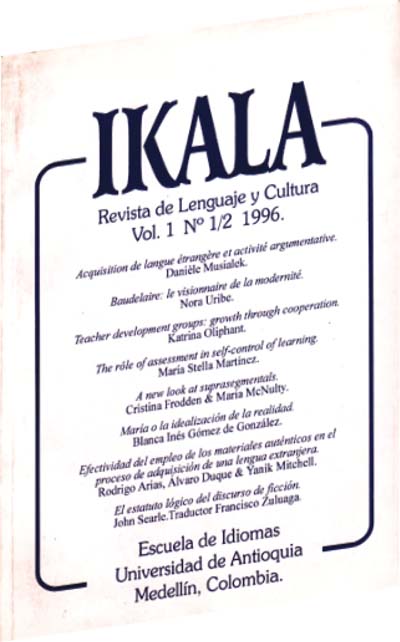Teacher Development Groups: Growth Through Cooperation
DOI:
https://doi.org/10.17533/udea.ikala.8035Schlagworte:
ESL, teacher development, teacher's groups, teacher networksAbstract
As a student working towards a Master's Degree in ESL, I often ponder the career choices that will be available to me upon completion of the program. Having made the commitment to professional development implicit in my decision to return to university, I hope to find a postion in an EFL setting that will nurture my desire for continued growth as a teacher. But how realistic is that prospect? My experience has shown me that many of the private language schools abroad are indifferent to teacher development; in fact, they often hire teachers with no qualifications. Profit, rather than the quality of teaching guides their decision-making. As long as their students continue to accept unqualified (and thus low-paid) teachers, they will have no motivation to hire professionals who will demand higher salaries. Even many of the more serious teaching institutions provide little or no in-service training.
Downloads
Literaturhinweise
Armour, M. (1985). Energy RX for writing teachers: Plug into a network. Language Arts,62, 759-764.
Chalfant, J.C., & Pysh, M.V. (1989). Teacher assistance teams: Five descriptive studies on 96 teams. Remedial and Special Education. 10, 49-58.
Crookes, G. (in press). Teacher action for the prerequisites for teacher development. In L.Y. Shem (Ed.), Proceedings of the 1994 ASOCQPI Congress. Colombia: ASQCOPI.
Deming, A.L. (1984). Personal effectiveness groups: A new approach to faculty development. Joumal of College Student Personnel. 25. 54-60.
Flythe, V.L. (1989). Beginning a faculty writing group. English Journal. 78, 62-63.
Gainen, J. (1993). A writing support program for junior faculty women. New Directions for Teaching and Learning, 53, 91 -100.
Joyce, B., Murphy, C., Showers, B., & Murphy, J. (1989). School renewal as cultural change. Educational Leadership. 47. 70-77.
Kirk, W., & Walter, G. (1981). Teacher support groups serve to minimiza teacher burnout: Principles for organizing. Education, 102, 147-150.
Matlin, M., & Short, K. G. (1991). How our teacher study group sparks change. Educational Leadership, 49, 68.
Paquette, M. (1987). Voluntary collegial support groups for teachers. Educational Leadership, 45, 36-39.
Philadelphia Teachers' Learning Cooperative (1984). On becoming teacher experts: Buying time. Language Arts.61, 731-736.
Plumb, K. (1988). Starting a teacher development group. Adapted from TESOL Franca News. 8, 17.
Raiser, L. (1987). A teacher support network. Teaching Exceptional Children.19, 48-49.
Schechter, S.R., & Ramírez, R. (1992). A teacher-research group in action. In D. Nunan (De.), Collaborative language learning and teaching (pp. 192-207). New York: Cambridge
University Press.
Watson, D., & Bixby, M. (1994). Teachers! A support group needs you! Teaching K-8. 24, 86-88.
Wolff, LB. & Vera, J.L. (1989). Teachers' Groups in Spain. The Teacher Trainer. 3. 14-16.
Downloads
Veröffentlicht
Zitationsvorschlag
Ausgabe
Rubrik
Lizenz
Copyright (c) 1996 Íkala, Revista de Lenguaje y Cultura

Dieses Werk steht unter der Lizenz Creative Commons Namensnennung - Nicht-kommerziell - Weitergabe unter gleichen Bedingungen 4.0 International.












